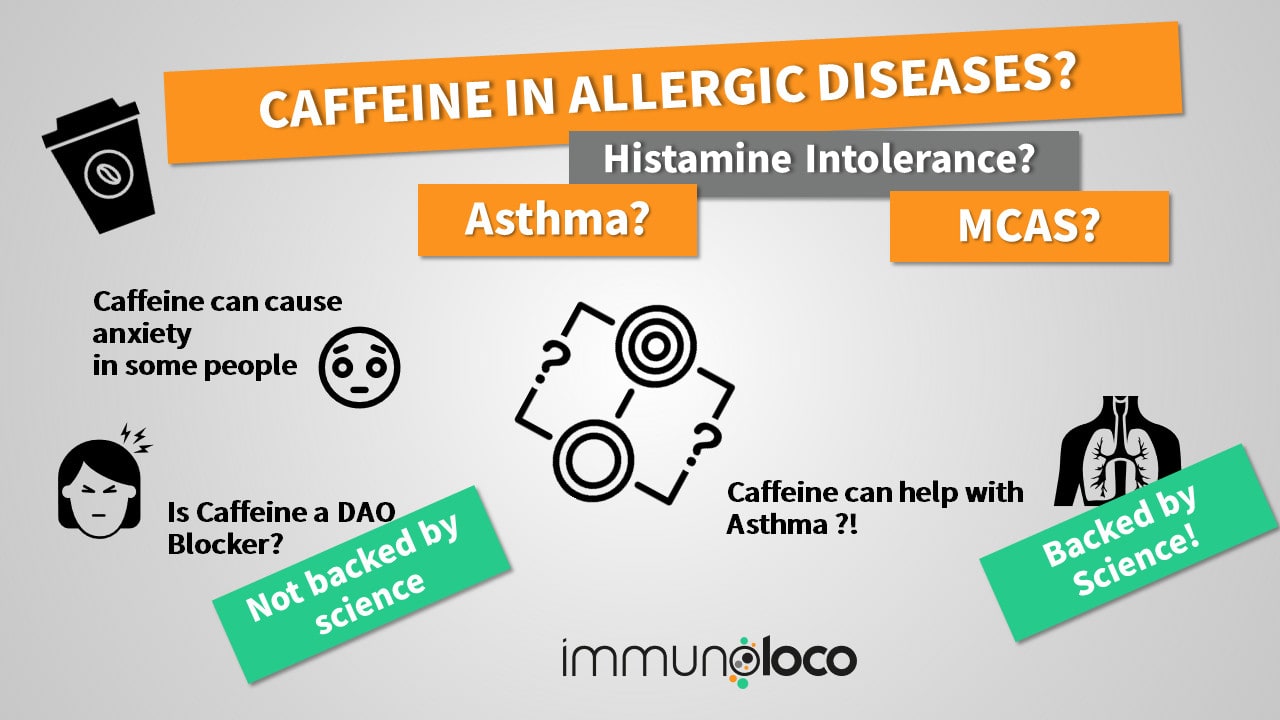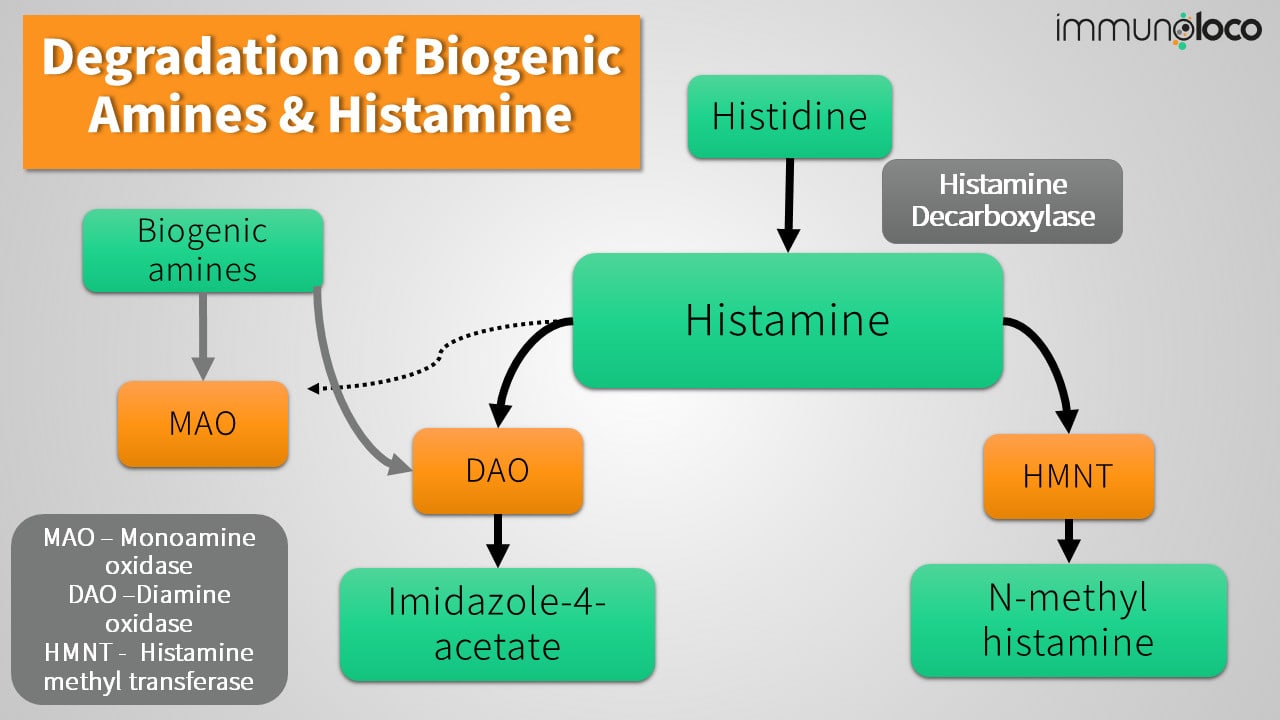
Caffeine is a stimulating substance, and as such responsible for the well-known effects of coffee. Moreover, especially in people not used to drinking a lot of coffee, it increases alertness and can help overcome tiredness. Still, some people are more sensitive to the effects of caffeine than others and experience a feeling of fidgetiness or restlessness and, as such, take a somewhat skeptical position when it comes to this drink.
Many articles about histamine intolerance only focus on coffee consumption and equate caffeine with coffee, thereby disregarding all other sources of caffeine – e. g. black tea. The slightly superficial result of those articles is often that coffee being a DAO inhibitor should be avoided by people suffering from histamine intolerance: What role does caffeine play in histamine metabolism in allergic patients?
This article is about a health issue. It is important that you have your symptoms examined and treated by medical professionals. This article is not intended to be, and cannot be, a substitute for the care and advice of medical professionals that may be available to you.
Is Caffeine a DAO inhibitor? Missing Evidence for this Thesis.
Caffeine is widely considered a DAO inhibitor, but I was unable to locate reliable scientific studies that support this theory despite extensive efforts. Nevertheless, the internet is full of articles precisely stating this. Just one example is the blog of the late Yasmina Ykelenstam (Healing Histamine), presenting one of the most common arguments for the DAO inhibiting effect of coffee:
According to some bloggers, the DAO inhibiting effect of coffee or black tea is based on a similarity between caffeine and the supposedly DAO inhibiting substance theophylline, as both substances belong to the group of methylxanthines. 1 However, there is proof that theophylline does not inhibit the diamine oxidase enzyme (DAO).2
Meanwhile, the SIGHI (Swiss Interest Group Histamine Intolerance) has removed theophylline from its list of medications that should be avoided. However, other websites still list theophylline as problematic – potentially without good cause, as explained above.

Caffeine in Histamine Mediated Diseases: Pro-Inflammatory or Not?
A variety of studies suggests that caffeine has anti-inflammatory effects but there are other studies suggesting the exact opposite effect. It appears a definitive judgment has not been established and is not expected anytime soon.
Considering all available evidence, it appears that coffee has a limited anti-inflammatory effect that exceeds the impact attributed to the contained caffeine. One possible explanation might be that secondary plant-derived substances found in coffee have other anti-inflammatory qualities.3
A variety of tea blends contain caffeine in relevant amounts as well. According to a table published by the Mayo Clinic, black tea contains 47 mg per 237ml (8 oz.) and, as such, about half the amount of the 96 mg included in the same amount of coffee.4
Despite both drinks containing significant amounts of caffeine, tea consumption is usually seen as less critical than coffee. How can that be? Both beverages contain next to caffeine and a range of other substances, various tannic acids. However, these tannic acids differ between coffee and tea, and so does the individual tolerance level.
People suffering from histamine intolerance are frequently very limited in what they can safely eat or drink. Drinking coffee is not only a matter of achieving the necessary amount of fluid intake, but coffee is something to be savored and enjoyed. I, for my part, would not want to abstain from drinking coffee without good reason. 😉

The Effect of Caffeine on Neurologic & Psychic Symptoms
Has caffeine a stimulating effect on the excretion of glutamate and histamine?
A study from 2014 looked at the effect of caffeine on the frontal part of the hypothalamus. This part of the brain is involved in the regulation of our vegetative nervous system. It controls crucial functions in our body by releasing various hormones, including body temperature, blood pressure, and other involuntary processes. 5
Caffeine increases neurotransmitter release (messenger substances in our brain) of glutamate and histamine in the hypothalamus. However, conclusions derived from this observation and applied to other cells in our body are of minimal validity.5
In people who are very sensitive to changes of the messenger mentioned above substances, caffeine might play a role in displeasing sensations experienced. There is also a possibility – and this is a speculation of mine – that a more potent effect might be seen in people with an inherited deficiency (e. g., HMNT variants) that results in slow histamine metabolization.
The enzyme Histamine-Methyltransferase (HMNT) is responsible for the intracellular metabolization of histamine. People with specific genetic variants resulting in a lower HNMT activity appear to be more affected by allergic symptoms stemming from decreased histamine metabolization. There is also a greater possibility of histamine-induced symptoms of the central nervous system.6,7 In my article about the causes of histamine intolerance, you can read up on the effects of diamine oxidase (DAO) and HNMT on histamine’s metabolization and the genetic variants affecting it.
Caffeine can create a well-known stimulating effect by releasing excitatory messenger substances in our brain, among others affecting the A2A-adenosine receptor. Specific mutations in genes encoding the adenosine receptor system are suspected to be related to increased levels of anxiety and even panic following caffeine uptake in certain individuals.8
Some scientists even speculate about the usefulness of A2A-Adenosine receptor inhibitors like caffeine in treating depression. These substances might help alleviate the loss of energy and motivation frequently seen in patients suffering from depressive episodes.9
Interested in more information & knowledge?
Every now and then, and only when there’s something interesting for you. Currently less than once a month, but packed with information – unsubscribe at any time and free of charge.
Caffeine in Mast Cell Activation syndrome (MCAS) & Allergies
Does caffeine have an anti-allergic effect?
Caffeine could cause the release of histamine, as explained above, but at the same time, there is evidence that suggests it has anti-allergic characteristics as well.10
Researchers caused severe allergic reactions in rats and observed that the allergic reactions were less severe in a group treated with caffeine.10 A study from 1997 has shown caffeine to reduce the release of histamine from mast cells of the peritoneum.11
Considering this it appears that caffeine can have a positive effect on allergic reactions by affecting the ability of mast cells to release histamine. The other type of cells having a large part in the genesis of allergic symptoms, basophilic granulocytes appear to be affected by caffeine as well. According to a study from 2019, were less likely to release their transmitter substances – among those histamine – when under the influence of caffeine.12
Maybe people suffering from mast cell activation syndrome or allergies who have a good tolerance for caffeine could benefit from caffeine uptake.
However, if intolerance to salicylic acid is present, coffee and tea might have distinctly adverse effects.
Caffeine with Intolerance to NSAIDs / Salicylate Sensitivity
Although caffeine can help with asthma, patients suffering from Morbus Samter (AERD) or intolerance to salicylic acid, coffee, or black tea might cause symptoms because of their high salicylate content. Especially problematic have proven blends containing bergamot (e. g. Earl Grey) or lemon beebalm (Lady Grey) and others because of the very high content of salicylic acid.13
Can Caffeine be of Use in Patients with Asthma?
Some studies report a positive effect of caffeine on asthma patients. They report a dilatation of bronchia (the small tubes through which air flows into the lungs), easing the distress of those patients.
Caffeine has the potential to falsify the results of pulmonary function testing.
The effect observed in these studies was strong enough for researchers to consider caffeine consumptions before pulmonary function tests as potentially impacting the usability of the results.14 A critical review of available scientific literature published in 2010 goes as far as to suggest that patients completely avoid caffeine intake prior to lung function tests or at least document the intake to avoid test results that are not reliable.15
If asthma is one of the cardinal symptoms of histamine intolerance, caffeine might be of benefit to those patients. However, great care should be taken if at the same time an intolerance to salicylic acid is present.
Conclusion
Caffeine might have a positive effect in some patients suffering from allergic reactions, especially those with asthma. The tolerance for caffeine and the beverages that contain it, varies greatly between individual people. There is certainly no reason to demonize caffeine and coffee because both can have positive effects – and be it only to put some lipstick on the pig of caffeine addiction. 😉
References
- Ykelenstam, Yasmina. Histamine & Caffeine Addiction | Healing Histamine. Accessed September 13, 2020. https://healinghistamine.com/histamine-caffeine-addiction/
- Metaye T, Baudry M, Lalegerie P. Enhancement of mitogen-induced lymphocyte proliferation by some inhibitors of alkaline phosphatase and diamine oxidase. International Journal of Immunopharmacology. 1989;11(6):629-636. doi:10.1016/0192-0561(89)90148-3
- Paiva C, Beserra B, Reis C, Dorea JG, Da Costa T, Amato AA. Consumption of coffee or caffeine and serum concentration of inflammatory markers: A systematic review. Crit Rev Food Sci Nutr. 2019;59(4):652-663. doi:10.1080/10408398.2017.1386159
- How much caffeine is in your cup? Mayo Clinic. Accessed August 18, 2020. https://www.mayoclinic.org/healthy-lifestyle/nutrition-and-healthy-eating/in-depth/caffeine/art-20049372
- John J, Kodama T, Siegel JM. Caffeine promotes glutamate and histamine release in the posterior hypothalamus. Am J Physiol Regul Integr Comp Physiol. 2014;307(6):R704-710. doi:10.1152/ajpregu.00114.2014
- Maintz L, Novak N. Histamine and histamine intolerance. Am J Clin Nutr. 2007;85(5):1185-1196. doi:10.1093/ajcn/85.5.1185
- Histaminintoleranz: IMD Institut für medizinische Diagnostik, Labor. Accessed February 17, 2019. https://www.imd-berlin.de/spezielle-kompetenzen/nahrungsmittelunvertraeglichkeiten/histaminintoleranz.html
- Alsene K, Deckert J, Sand P, de Wit H. Association Between A 2a Receptor Gene Polymorphisms and Caffeine-Induced Anxiety. Neuropsychopharmacology. 2003;28(9):1694-1702. doi:10.1038/sj.npp.1300232
- López-Cruz L, Salamone JD, Correa M. Caffeine and Selective Adenosine Receptor Antagonists as New Therapeutic Tools for the Motivational Symptoms of Depression. Front Pharmacol. 2018;9. doi:10.3389/fphar.2018.00526
- Shin H-Y, Lee C-S, Chae H-J, et al. Inhibitory effect of anaphylactic shock by caffeine in rats. International Journal of Immunopharmacology. 2000;22(6):411-418. doi:10.1016/S0192-0561(00)00006-0
- Teraoka H, Akiba H, Takai R, Taneike T, Hiraga T, Ohga A. Inhibitory effects of caffeine on Ca2+ influx and histamine secretion independent of cAMP in rat peritoneal mast cells. Gen Pharmacol. 1997;28(2):237-243. doi:10.1016/s0306-3623(96)00186-3
- Nugrahini AD, Ishida M, Nakagawa T, Nishi K, Sugahara T. Anti-degranulation activity of caffeine: In vitro and in vivo study. Journal of Functional Foods. 2019;60:103422. doi:10.1016/j.jff.2019.103422
- The RPAH Elimination Diet Handbook with food and shopping guide – Allergy Unit – Royal Prince Alfred Hospital. Accessed September 13, 2020. https://www.slhd.nsw.gov.au/rpa/allergy/resources/foodintol/handbook.html
- Duffy P, Phillips YY. Caffeine consumption decreases the response to bronchoprovocation challenge with dry gas hyperventilation. Chest. 1991;99(6):1374-1377. doi:10.1378/chest.99.6.1374
- Welsh EJ, Bara A, Barley E, Cates CJ. Caffeine for asthma. Cochrane Database Syst Rev. 2010;(1):CD001112. doi:10.1002/14651858.CD001112.pub2
Immunoloco unterstützen
immunoloco möchte Betroffenen kostenlos gute und hilfreiche Informationen rund um ein verrücktes Immunsystem bieten. Du findest das gut? Dann unterstütze immunoloco und meine Arbeit doch gerne. Jeder Euro zählt und hilft, das Projekt weiterleben zu lassen.

